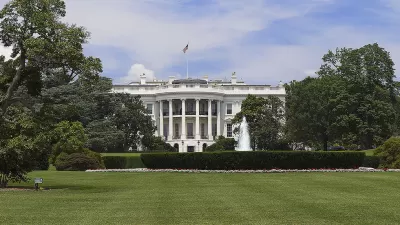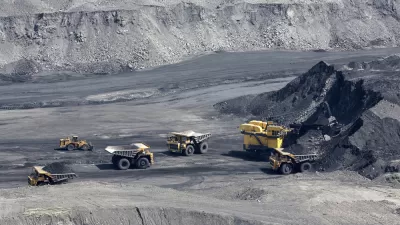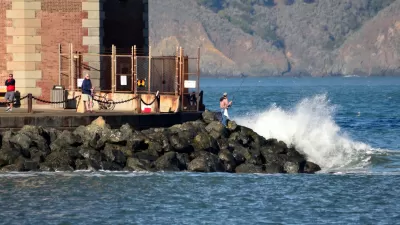The White House is planning to establish a new climate panel, headed by a well-known climate denier, to question the findings of the president's own intelligence agencies that climate change does indeed pose a national security risk.

"The White House is working to assemble a panel to assess whether climate change poses a national security threat, according to documents obtained by The Washington Post, a conclusion that federal intelligence agencies have affirmed several times since President Trump took office," report Juliet Eilperin Missy Ryan.
- The Defense Department issued a report last month "detailing how a changing climate is a national security threat and makes the military’s job around the world harder," reported Alex Ward for Vox (via Planetizen).
- "For the third time during the current U.S. Administration, climate change was included in the annual 2019 Worldwide Threat Assessment of the US Intelligence Community [pdf] released by the Director of National Intelligence, Dan Coats," according to the nonpartisan Center for Climate and Security
"The proposed Presidential Committee on Climate Security, which would be established by executive order, is being spearheaded by William Happer," an emeritus professor of physics at Princeton University who currently serves as a National Security Council senior director, add Eilperin and Ryan.
Happer's form of climate denial is different than, say, President Trump's, who famously called it a Chinese hoax and dismissed the findings last November of 13 federal agencies in the Fourth National Climate Assessment. Rather, Happer denies that carbon dioxide is harmful, and likened it to being "maligned like 'Jews under Hitler,'” writes
One expert put it simply in an interview with the reporters, calling the proposed panel "an effort to undermine the consensus within the national intelligence community that climate change needs to be addressed to avert serious consequences."
-
Defense Department Calls Climate Change a National Security Threat, January 21, 2019
-
Climate Report Written by Federal Government Warns of Dire Impact on Economy, November 27, 2018

Trump Administration Could Effectively End Housing Voucher Program
Federal officials are eyeing major cuts to the Section 8 program that helps millions of low-income households pay rent.

Planetizen Federal Action Tracker
A weekly monitor of how Trump’s orders and actions are impacting planners and planning in America.

Ken Jennings Launches Transit Web Series
The Jeopardy champ wants you to ride public transit.

Washington Legislature Passes Rent Increase Cap
A bill that caps rent increases at 7 percent plus inflation is headed to the governor’s desk.

From Planning to Action: How LA County Is Rethinking Climate Resilience
Chief Sustainability Officer Rita Kampalath outlines the County’s shift from planning to implementation in its climate resilience efforts, emphasizing cross-departmental coordination, updated recovery strategies, and the need for flexible funding.

New Mexico Aging Department Commits to Helping Seniors Age ‘In Place’ and ‘Autonomously’ in New Draft Plan
As New Mexico’s population of seniors continues to grow, the state’s aging department is proposing expanded initiatives to help seniors maintain their autonomy while also supporting family caregivers.
Urban Design for Planners 1: Software Tools
This six-course series explores essential urban design concepts using open source software and equips planners with the tools they need to participate fully in the urban design process.
Planning for Universal Design
Learn the tools for implementing Universal Design in planning regulations.
Heyer Gruel & Associates PA
Ada County Highway District
Institute for Housing and Urban Development Studies (IHS)
City of Grandview
Harvard GSD Executive Education
Toledo-Lucas County Plan Commissions
Salt Lake City
NYU Wagner Graduate School of Public Service





























